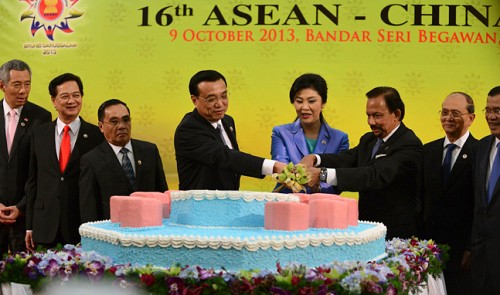Kerry to push China, SE Asia to discuss sea dispute
U.S. Secretary of State John Kerry will push Southeast Asian leaders and China to discuss the East Sea dispute at an Asian summit, a senior U.S. official said on Wednesday, despite Beijing's reluctance to address the issue at such meetings.
Kerry arrived in Brunei on
Wednesday for an annual East Asia Summit (EAS) and talks with leaders of
Southeast Asian nations and, separately, Chinese Premier Li Keqiang. 
President Barack Obama last week cancelled his scheduled trip to the summit because of the U.S. government shutdown, raising concern that Washington would lose some of its influence in countering China's assertive claims over the Sea and in maintaining its strategic "rebalancing" toward Asia.
"That rebalance is a commitment, it is there to stay and will continue into the future," Kerry told ASEAN leaders in opening remarks shortly after arriving, saying the crisis in Washington was nothing more than "a moment in politics."
China has resisted discussing the territorial issue with the 10-member Association of Southeast Asian Nations (ASEAN), preferring to settle disputes in the East Sea through one-to-one negotiations with individual claimants.
"The Chinese consistently indicate their view that 'difficult issues' that might fall outside the comfort zone of any member need not be discussed," said the U.S. official.
"That is not a view that is held by the U.S., or, I believe, many if not most of the EAS member states, but we will find out."
The conflicting claims over the East Sea pit an increasingly assertive Beijing against smaller Asian nations that look to support from the United States. The row is one of the region's biggest flashpoints amid China's military build-up and the U.S. strategic "pivot" back to Asia signalled by the Obama administration in 2011.
China claims almost the entire oil- and gas-rich East Sea, overlapping with claims from Taiwan, Malaysia, Brunei, the Philippines and Vietnam.
The United States says it is officially neutral but has put pressure on China and other claimants to end the dispute through talks.
Kerry would emphasise the role of the United States as "a longstanding champion of security and stability in the region, and as an advocate of the rule of law, peaceful solution of disputes, and freedom of navigation, and the principle of unimpeded lawful commerce", the senior official said.
Nevertheless, Washington will be hamstrung at the summit because of Obama's absence.
"I'm sure the Chinese don't mind that I'm not there right now," the U.S. president said at a news conference in Washington on Tuesday. "There are areas where we have differences and they can present their point of view and not get as much push back as if I were there."
Appearance of dialouge
In an apparent softening of its previous stance, China agreed this year to hold "consultations" with ASEAN on a code of conduct (CoC) for disputes in the East Sea.
But some diplomats and analysts say China may be giving the appearance of dialogue without committing to anything substantive, aiming to drag the talks out for years while it consolidates its expansive maritime claims.
"It's a face-saving mechanism to show the world, to show ASEAN, that China is committed to come up with a CoC but the consultations are designed to delay formal negotiations on a binding code," said one diplomat from an ASEAN nation.
However, Premier Li said the CoC talks in the city of Suzhou last month were a success and China would be willing to build on that, although he did not give any specifics.
"We've always agreed that East Sea disputes should be dealt with in a direct way, and to seek a resolution through negotiations and talks," Li said in a speech at the summit.
He, however, maintained that China was "unshakable in its resolve to uphold national sovereignty and territorial integrity".
The dispute has soured relations between China and U.S. ally the Philippines, in particular. The two countries have been involved in naval standoffs and China has effectively occupied a shoal 124 nautical miles (230 km) off the Philippine coast.
Manila is taking part in the CoC talks but has angered China by launching an arbitration case with the United Nations on the validity of China's claims.
Philippine President Benigno Aquino stressed the importance of the rule of law to the region's economic well-being in a speech on Wednesday, calling for a return to the naval status quo that existed at the time a 2002 non-binding agreement on maritime conduct was signed by China and ASEAN.
"Our development as a region cannot be realized in an international environment where the rule of law does not exist," Aquino said.
(TTO)

